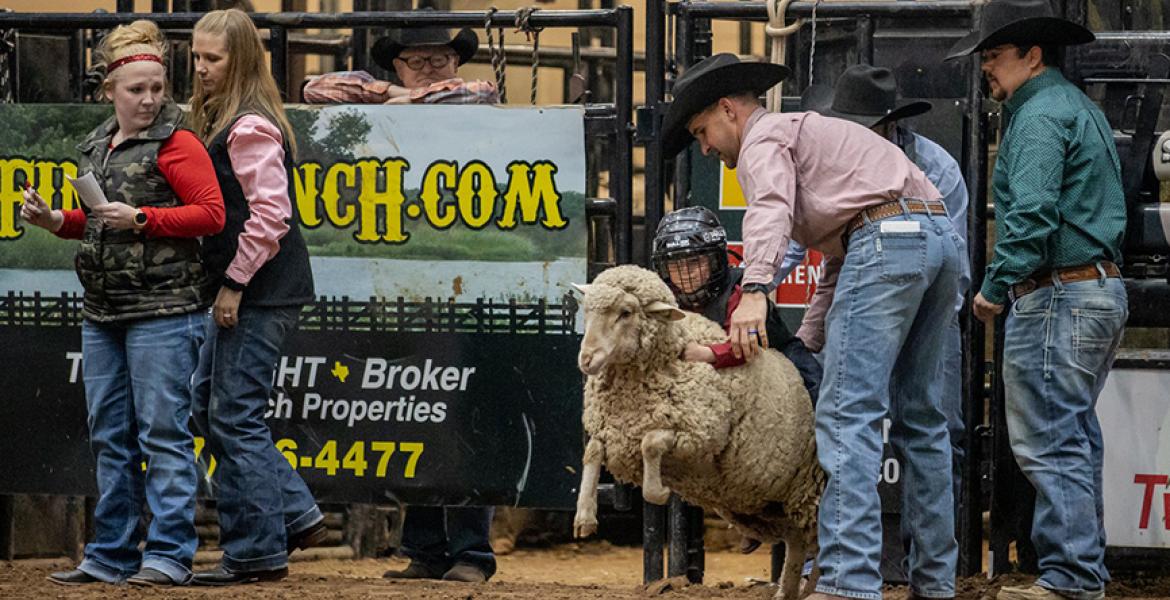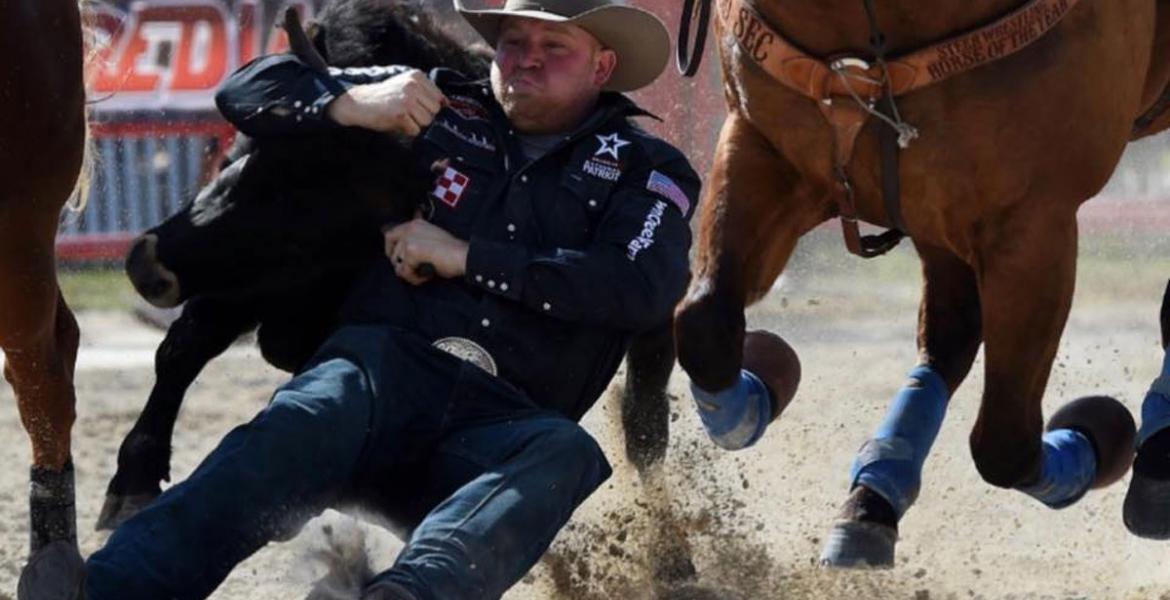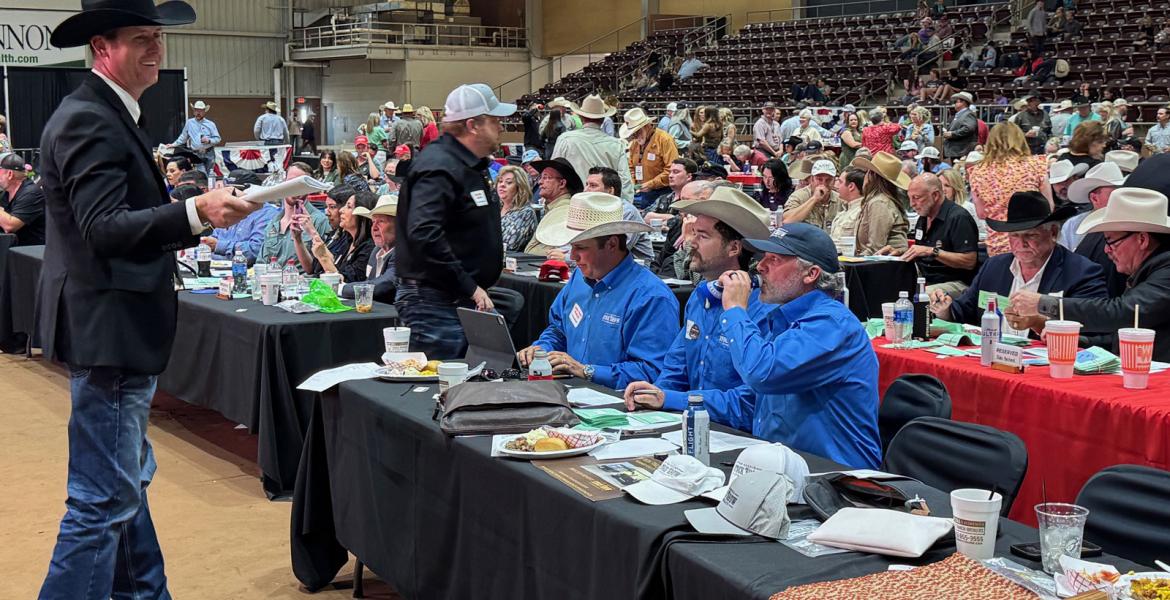San Angelo Rodeo was in full swing at the Foster Communications Coliseum this past weekend, with a packed house. Fans clapped their hands in sync to rock-and-roll music in between each go-round. Kids with sticky hands and stained cotton candied faces shrilled in delight at rodeo clowns and each contestant alike.
Troy Lerwill, one of the rodeo clown’s on hand at Friday night’s performances, reveled in the excitement of the crowd post-rodeo.
“The crowd was outstanding,” he said. “Sold out crowd again, 6,000 people, it was wonderful. When the crowd is electric like that the whole rodeo is phenomenal. It all comes together. I don’t know if these people know how important it is, but they’re the ones that make this whole rodeo.”
Lerwill hasn’t been to San Angelo in 10 years, but says the crowd and the people are just as he remembers them. He’s been in the business for 20 years, and in those two decades has traveled all over, meeting people and putting on shows.
“I started out as just a bull fighter and then I got into the comedy part of it,” he explained. “Then I had also a background in motorcycles, so then I started doing a little comedy act, motorcycle thing. Then it turned into the ‘Wild Child’ act.”
Troy’s ‘motorcycle thing’ had the San Angelo crowd laughing and applauding, all while on the edge of their seats.
As an entertainer, Troy said, the most important thing in his opinion is drawing people into an atmosphere far removed from the outside world.
“If people come to a rodeo and forget about all the worries and troubles and the house payment and all the stuff they worry about day-in and day-out. If they can come and I can help them forget about it for a couple of hours and make them laugh [then that’s my goal],” Lerwill said. “Hopefully people go home tonight and they’re laying in bed and they think of some stupid thing I’ve said or something I did and it makes them chuckle, you know. If that happens, my job is done.”
Casey Baize, rodeo chute boss for the committee, explained that a few hours prior to each event, the rodeo committee, announcer Boyd Polhamus and Hambone, the sound engineer, meet to discuss and plan out the performances.
“…here in San Angelo…they know their jobs, they know what to do, everybody communicates well and it really runs the show off good,” Baize said. “…we try for [a show duration of] about two hours if we can, and animals have their own minds sometimes, so you never know what’s going to happen, but we try to shoot for that two hour mark…”
Precautions are taken for humans and animals alike. In the event of an accident or injury, a team of trained sports medicine officials and a local orthopedic surgeon tend to the cowboys.
“The Justin Sports Medicine program, they go to all the big rodeos all year at the PRCA (Professional Rodeo Cowboys Association) and if a guy gets hurt, they’re there,” Baize said. “I mean, they…take them back there in the medical room in their sports trailer there and if it’s bad enough and they’ve got to get them to the hospital, the ambulance is here. They make sure they’re stabilized and get them there.”
If an animal is injured, Baize said, which is a very rare occasion; he and others working the rough stock events are trained to handle the situation. There are vets on scene, he explained, and Arden Road Animal Clinic isn’t too far away.
“Those guys are the best anywhere around here,” Baize said, mentioning two doctors from the Arden Road Clinic. “Everything’s covered. You really try to have all the T's crossed and I's dotted, and everybody’s pretty confident on what everybody’s supposed to do, so it works out pretty good.”
Stock contractors will pay from $50,000-200,000 for bulls or horses, Baize explained, thus care and medical attention is a priority for the animals.
“They get better care than most human beings do,” he said. “They work probably 30 seconds out of the year and they’re fed, watered, taken care of. It’s really unbelievable—if you get behind the scenes—how well they’re taken care of.”
Although he hasn’t witnessed any in San Angelo, Baize said that on occasion animal rights activists will set up in the parking lots to protest the rodeo, particularly on the west coast.
“The biggest issue is that they’re just not educated,” he said. “They hear all these horror stories. The way I always try to handle it, I meet them and then I try to take them back behind the bucket chutes and let them see that it’s not some kind of torture.”
Baize said in reference to a wide spread misconception about animal abuse at the rodeo.
“The flank strap’s not tied under the testicles…” Baize said, noting strict guidelines that prohibit beating on the animals and the use of devices such as hot shots.
Baize rodeoed twelve years himself as a bull rider, and spent the better part of the year touring the country for a quick ride on the back of a bucking bull. He misses the experience, he said, but not all the surgeries and hospital stays.
Over the course of his career, Baize underwent two shoulder surgeries, two face surgeries, a knee surgery, sustained a major head injury, broke numerous ribs, broke his nose multiple times and had over 20 concussions, he said, and that’s the short list.
Now, the Wall native is the director of the PRCA’s Texas bull riding circuit, and works multiple events throughout the year, which keep him involved in the sport despite the fact that he’s no longer riding.
“I’m the chute boss for the committee, (here in San Angelo), and basically what that is—bareback riding, saddle bronc riding and bull riding, we’re the guys that kind of keep the show going. We tell the guy, ‘Hey, you’re next,’ or ‘Hey you’ve got one guy ahead of you’.
If I was a little younger…” he pondered, “…when you hit 30, for a bull rider, that’s really old. It really is,” he said when asked if he wished he could still ride. “It’s neat…” he said, reflecting on the past. “I got the little rockstar life for a while, just without all the money. It’s a young man’s sport.”
Subscribe to the LIVE! Daily
Required






Comments
Listed By: Green Mesquite
I'm disappointed that we're not seeing the likeness of Obama or Hillary during the performances! Of course, I recall from a few years ago (actually August 2013) all the negative publicity a Clown received who wore an Obama mask. What is so wrong about someone expressing themselves regarding a politician? "The performer was permanently banned from future state fair events and subsequent performers must undergo sensitivity training." Sensitivity Training for a Rodeo Clown? Myself, I thought it hilarious! (http://www.foxnews.com/politics/2013/08/15/calls-for-federal-probe-into-missouri-rodeo-clown-are-contrived-anger-critics/). Anyone keep count of the number of time Ronald Reagan was parodied?
- Log in or register to post comments
PermalinkPost a comment to this article here: